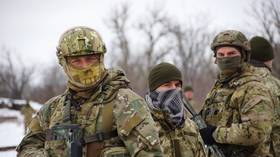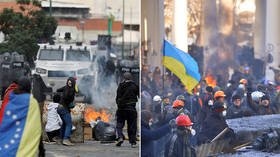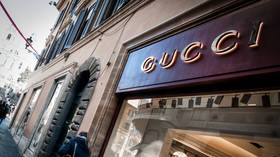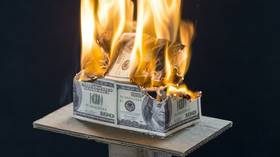No joke! Ukraine’s presidential choice: an oligarch, a gas princess or a comedian
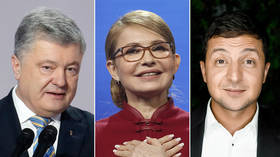
For some time, it was assumed that Yulia Tymoshenko would challenge Petro Poroshenko for the Ukrainian presidency in next month’s election. However, out of nowhere, Volodymyr Zelensky has now emerged as the frontrunner.
For Ukrainians able to vote in next month’s presidential election, the choice is now pretty clear. There are three options: the incumbent oligarch anti-Russia hardliner, the femme fatale of Kiev’s political scene, or a comedian best known for playing a fictional president in a popular TV drama.
While his candidacy originally inspired much bemusement, nobody’s laughing now at Zelensky. Because the entertainer has surged into a nine-point polling lead with just six weeks left before the big day.
New Ukrainian KIIS presidential poll shows comic Volodymyr Zelenskiy growing his lead to 26.9%, with President Poroshenko behind him at 17.7% and Tymoshenko retaining third position at 15.8% after leading for months and slipping in recent weeks. https://t.co/7DE0rTZ8Wv
— Christopher Miller (@ChristopherJM) February 14, 2019
Right now, here’s the state of play: Zelensky 26.9 percent, Poroshenko 17.7 percent, and Yulia Tymoshenko 15.8 percent.
Asked why they favor the newcomer, 54 percent of his backers cite his status as a fresh face, who’s up against a number of figures who’ve been on the political scene for donkey’s years.
Ukraine’s political and financial elites are tightly knit. For instance, a decade ago, Poroshenko served as foreign minister in Tymoshenko’s cabinet. And, in 2011, when, subsequently ousted, President Viktor Yanukovich locked up Tymoshenko on dubious charges, Poroshenko was acting as his trade minister.
Kiev’s political merry-go-round might be cynical, but it’s rarely boring. And this is the reality of politics in the former USSR: the more competitive the contest, the more unstable the state.
Russia is a case in point, where the devastating ‘90s provided “interesting” bouts, but horrid economic conditions, leading to disillusionment with the concept of “liberal democracy” itself. This has inspired almost two decades of Putinist domination since the present helmsman turned the ship around.
In the Baltics, the norm is rule by stable coalitions. Most notably in Latvia, where the last three elections have seen multi-party rainbows of various nominal ideologies, formed to keep the most popular grouping out of office. This is because it argues for closer ties with Moscow.
Other nations in the post-Soviet sphere with relatively high living standards are outright authoritarian regimes: Belarus, Azerbaijan and Kazakhstan. These have all been ruled by the same figure, or family, since just after the Soviet collapse.
This means political junkies are left to get their kicks from the poorer relations: most notably the chaotic cousins of Georgia, Moldova and Ukraine. These countries are all united by rampant corruption and widespread poverty. And, of course, a desire to integrate with the European Union and the “US-led global order.” Among elites, at least.
Lively times
Let’s be honest, last year’s Russian presidential election was boring. Despite the best efforts of the communist candidate and eventual runner-up, Pavel Grudinin, to energize the race.
However, we can’t say the same about Ukraine’s forthcoming joust, where all of the three frontrunners stand a realistic chance of taking control of the Bankova, the presidential administration of Ukraine.
As far as platforms go, Zelensky’s plans are pretty radical. Ideas include facilitating the opening of a business in an hour, getting a passport in 15 minutes, and voting in elections online. He also pledges a form of Swiss-style “direct democracy” and promises to lift legal immunity from elected officials.
The Russian-speaker backs Ukraine’s NATO ambitions and wants the EU to help Kiev end its war against Moscow-backed rebels in the East.
Poroshenko’s election slogan is “Army. Language. Faith.” And he hopes the country’s recent mild economic turnaround (albeit from close to rock bottom) will bolster his chances of retaining office. The militant leader is talking about EU membership as early as 2024. This, to be fair, is as likely as a successful Ukrainian Moon mission.
Also on rt.com ‘Does Putin know he’s running?’ Poroshenko mocked for dragging Russian president into campaign adThe incumbent is also banking on public support for his efforts to create the newly formed Orthodox Church of Ukraine. This has resulted in 271 parishes defecting from the Russian equivalent, thus far. It sounds impressive until you consider that over 10,000 remain loyal to Moscow. Indeed, while Poroshenko’s machinations may have helped shore up his support in the west of country, helping him pass out Tymoshenko, they also probably hardened eastern hostility.
Cheap gas & Polish wages
The present third-wheel, Tymoshenko, had been leading the polls for a long time before the Zelensky surge and the church separation. This is her third attempt to reach the Bankova after finishing as runner up in 2010 (to Yanukovich) and 2014 (to Poroshenko).
Her New Course of Ukraine program pledges the return of Donbass and Crimea to Kiev’s control along with a new constitution. Tymoshenko promises that this will crush the oligarch and clan system that dominates Ukraine. However, skeptics point out that she’s long been a part of the problem in this regard.
A key Tymoshenko guarantee is to halve gas prices for households within a month of assuming office. Of course, the only realistic way to achieve this aim is to make a deal with Russia. This would, presumably, aggravate Ukraine’s powerful far-right, and potentially lead to considerable disorder. Also, she insists she can bring salaries to Polish levels within five years, which is complete pie in the sky. Unless, that is, Warsaw is poised to suffer a massive economic collapse which nobody else has foreseen.
While we’ve focused on the front three, there are other contenders. Most notably Yuri Boyko, a former vice PM and leader of the so-called “pro-Russia” grouping. Achieving support of 10 percent would be a success for Boyko – especially given that Ukrainians living in Russia (a potential electorate of well over a million) have been disenfranchised, ostensibly for “security reasons.” Although, it’s coincidental how these voters are almost certainly the least likely to favor Poroshenko. Meanwhile, former defense minister Anatoliy Gritsenko is another who will do well to finish in the top four.
Grand bargain?
The fact that the outcome is uncertain will be used by Kiev’s supporters as evidence of its “democratic progress.” But in reality, Ukraine is more of an oligarchy than a democracy. Even newcomer Zelensky is quite obviously backed by controversial billionaire Igor Kolomoisky, who has been using his TV interests to support the funny man’s campaign.
Nevertheless, no matter who wins, Ukraine really only has two choices. The first is to remain propped up by Western loans and continue pursuing a very unlikely path to EU and NATO membership, while leaving the Donbass question unresolved. This would keep nationalists quiet, at least in the short term, but leave the country in limbo with its economic potential curtailed.
The second option is to negotiate with Moscow and try to re-integrate the Donbass while agreeing to take Russia’s security concerns into account. Of course, this means forgetting about NATO, with the risk of blowback from nationalist headbangers. Although Russia may compromise on accession to the EU, assuming Brussels will actually accept Ukraine, when push comes to shove.
These are decisions facing the next occupant of the Bankova. If it’s Poroshenko, expect no change. But Tymoshenko and, especially Zelensky, may just be pragmatic enough to try and end the impasse.
Think your friends would be interested? Share this story!
The statements, views and opinions expressed in this column are solely those of the author and do not necessarily represent those of RT.

